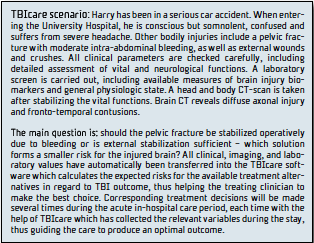By Mark van Gils & Olli Tenovuo
Traumatic brain injury (TBI) occurs when a sudden trauma causes damage to the brain. Every year, over 1,600,000 patients sustain a traumatic brain injury in the EU, and 70,000 of these die, with a further 100,000 being left handicapped. Significantly, 75% of the victims are children and young adults, and TBI is the leading cause of disability in people under 40 years of age. TBI results in more lost working years than cancers, stroke and HIV/AIDS together. On a global scale, the number of life years lost due to TBI is four times that of diabetes-related loss. Recent statistics show a steep increase in the incidence of TBIs, with an increase of 21% over the last five years – threefold greater than the rate of increase in population. Despite this, TBI has been seriously underrepresented in medical R&D efforts compared to many other, less significant health problems.
Due to a vast degree of variation in the injuries of individual patients, the methods currently in use in the treatment of brain injury patients lack strong scientific evidence. The EU-funded project TBIcare provides an objective and evidencebased solution for management of TBI by improving diagnostics and treatment decisions for an individual patient by matching a patient’s individual data with the injury’s characteristics. In this way it allows each brain injury patient to receive individual treatment that is optimized for his or her needs.

The project develops a tool that will make the day-to-day clinical work of doctors easier and also revolutionize the treatment of TBI. This software tool will enable doctors to match the patient-related variables with the injury-related variables through the combined use of various databases. Using extensive database and system simulation, the software will then form a detailed analysis of the nature of the patient’s brain injury, its optimal treatment and predicted outcome. A scenario illustrating the TBIcare concept is given in the box text. The project has two scientific objectives; development of 1) a methodology for finding efficient combinations of multi-modal biomarkers in statistical models to objectively diagnose and assess an individual TBI patient, and 2) a simulation model based for objectively predicting outcome of the planned treatment of an individual TBI patient.
The first objective is addressed by using an approach in which a high number of vital signs or biomarkers, relevant to TBIs, are explored from sets of heterogeneous data. These include, for example, structural and functional changes visible in imaging data (computerized tomography, CT; magnetic resonance imaging, MRI; positron emission imaging, PET), changes in electrophysiology (electroencephalography, EEG); changes in bedside multimodality monitoring parameters including systemic cardiac and respiratory physiology, intracranial pressure (ICP), and brain chemistry (monitored by oxygen sensors and microdialysis); and changes in metabolomics visible in the blood. We define sets of biomarkers from several thousand brain injury cases retrospectively, and from several hundred TBI cases and healthy controls prospectively. The goal is to build statistical models allowing standardized and objective interpretation of data from a single patient. The diagnostic rules are derived by comparing the patient data to the most similar cases in a database using statistical inference.
Work towards reaching the second objective uses these statistical models as a basis for the construction of a simulation model. Due to the unique responses to treatments, the simulation model must be individualized. The model is personalized for each patient separately using data only from similar cases. Various approaches can be used for the simulations, such as concepts from system dynamics or Bayesian networks. In the TBIcare concept individual physiological measures and various treatments form the building blocks of the system dynamics model which is used to predict the outcome.
The simulation model provides important information both for scientists and clinical practitioners. It helps a scientist to better understand a human as a system – a viewpoint central to the Virtual Physiological Human. A clinician is able to test the influence of various treatments by first simulating them. As the variability of the individuals and traumas is huge, we do not expect that a simulation model built from hundreds of cases is enough for reliable prediction of the outcome. However, our aim is to develop a strictly evidence-based simulation model for objectively predicting the outcome of treatment and rehabilitation of an individual TBI patient. The model provides objective evidencebased information about the most probable outcome and will be a step towards a scientifically valid approach for treatment planning. This model will be a basis for future development, where an increasing amount of validated clinical data will continuously improve the reliability and usability of the model. In addition, this kind of model may be used to optimize the diagnostic procedure in TBIs, e.g. it may advise the clinician to take some further tests in order to improve the reliability of the model for a certain individual.
These scientific objectives are supplemented by realization of technical objectives: a software solution to be used in daily practice to diagnose and plan treatments; new approaches for extracting information from multi-source and multi-scale physiological databases for management of an extremely heterogeneous disease; and innovative data quantification methods for the clinical TBI environment. Thus, TBIcare transfers the scientific Virtual Physiological Human (VPH) concepts to clinical practice.
TBIcare has impacts for healthcare professionals by improving the healthcare process and increasing medical knowledge; for the patients and their nearest by increased quality adjusted life years; for society it brings reduction in healthcare costs and losses due to working disability, and for the European industry it brings an impetus to increased global competitiveness by providing immediately exploitable innovative methods.
This work is supported by the European Commission under the 7th Framework Programme (FP7-270259-TBIcare). This EU co-funded project has started on 1 February 2011. It is co-ordinated by VTT Technical Research Centre of Finland and the consortium includes GE Healthcare Ltd. (UK), Turku University Central Hospital (Finland), University of Cambridge (UK), Imperial College London (UK), Complexio S.a.r.L. (France), Kaunas University of Technology (Lithuania), and GE Healthcare Finland Oy.
Mark van Gils , Ph.D. VTT Technical Research Centre of Finland mark.vangils@vtt.fi
Olli Tenovuo , Ph.D. Turku University Central Hospital Finland olli.tenovuo@tyks.fi
About Brenda Wiederhold
President of Virtual Reality Medical Institute (VRMI) in Brussels, Belgium.
Executive VP Virtual Reality Medical Center (VRMC), based in San Diego and Los Angeles, California.
CEO of Interactive Media Institute a 501c3 non-profit
Clinical Instructor in Department of Psychiatry at UCSD
Founder of CyberPsychology, CyberTherapy, & Social Networking Conference
Visiting Professor at Catholic University Milan.






